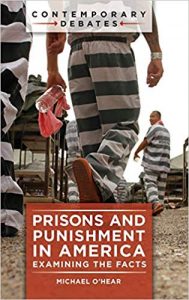New Book on Sentencing and Corrections
 I am pleased to report that my latest book, Prisons and Punishment in America: Examining the Facts, is now in print. Structured as a series of questions and answers, the book synthesizes the law and social science on sentencing, corrections, and prisoner reentry. Individual chapters cover:
I am pleased to report that my latest book, Prisons and Punishment in America: Examining the Facts, is now in print. Structured as a series of questions and answers, the book synthesizes the law and social science on sentencing, corrections, and prisoner reentry. Individual chapters cover:
- Sentencing law and practice
- Alternatives to incarceration
- Experience and consequences of incarceration
- Release and life after prison
- Women, juveniles, and other special offender populations
- Causes and significance of mass incarceration in the U.S.
- Race, ethnicity, and punishment
- Public opinion, politics, and reform
The book is intended to be accessible to readers who do not have training in law or social science, but I also hope that there are some aspects of the book that will be of interest even to those who are already quite familiar with the workings of the criminal justice system.
